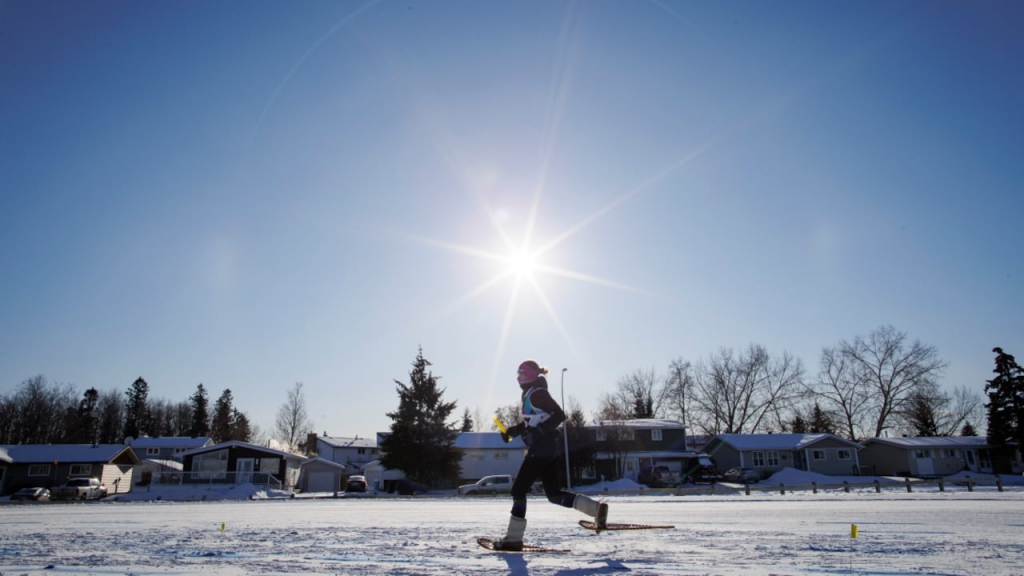“We understand that this decision may be disappointing. Every effort was made to minimize disruption and ensure that all athletes have access to safe, equitable, and well-supported opportunities to compete,” Brown told the coach.
“The GNWT remains committed to working with community leaders and sport organizations to explore interim governance solutions and long-term development strategies for affected sports.”
In other letters, Brown told the N.W.T.’s ski biathlon and snowshoe biathlon teams (snowshoeing and snowshoe biathlon are separate sports) they would be reduced by two athletes each below the full size permitted by organizers.
Brown told the teams the decision had been made “following a thorough review of all submitted data and considering overall team capacity.”
An official connected to the N.W.T.’s biathlon team, who asked for anonymity to discuss the changes, said eight ski biathletes and eight snowshoe biathletes are typically sent by the N.W.T. to each edition of the Arctic Winter Games.
This year, the cap has been set at six ski biathletes, six snowshoe biathletes and one fewer coach in each discipline.
“It’s frustrating, for sure. We have so many athletes that had been working really hard,” the official said.
“We as a [territorial sport organization] have also been working hard on bringing biathlon to the North and expanding it.
“It’s been difficult because Hay River is having its own issues with the ski club. So, as a TSO, we’ve been working to really perpetuate the sport and this feels like a slap in the face.”
The N.W.T. Biathlon Association must now decide whether to cut participants from its U15 or U18 age categories to meet the six-athlete limit.
Wrestling was also named by Brown as a sport affected by a reduction in numbers for Whitehorse 2026.
A representative of the N.W.T.’s wrestling community said the sport was still awaiting its final allocation of places and did not yet have any comment.
Not funding-related, GNWT says
Sport North had already moved to centralize trials for all sports in Yellowknife ahead of the Whitehorse Arctic Winter Games, instead of holding some events in smaller communities, on the grounds that the GNWT had sought to reduce the associated expenses.
The Town of Hay River was among groups to express concern about that change, which some participants say will unfairly advantage Yellowknife athletes.
Biathlon N.W.T., Cross Country N.W.T., the Yellowknife Ski Club and the Hay River Ski Club are understood to be drafting letters to Sport North requesting a change of venue for the trials, and a meeting on the issue had been scheduled for Thursday.
While the centralization of trials was a move made to reduce costs, reached by Cabin Radio on Thursday, Sport North executive director Bill Othmer said the latest decisions on team size were made by the territorial government based on recommendations from its Multisport Games Committee.
“The decision is related to ensuring Team N.T.’s allocation of participants is maximized,” Othmer said in an email.
Maca spokesperson Alice Twa said the decision was not related to GNWT funding changes.
“The Arctic Winter Games International Committee sets maximum team size for each jurisdiction,” Twa said, adding the number of interested participants from the territory for the 2026 games exceeds the team size.
“For the Northwest Territories, this is 363 participants, including 355 sport-related positions and eight cultural-related positions.”
“Athlete positions were prioritized while also ensuring safe environments through appropriate adult supervision and greater attention to gender representation among coaching staff,” Twa said.
A Beaufort Delta snowshoe team?
Holly Jones, a coach working primarily with Inuvik youth involved in snowshoeing, said snowshoeing is the primary sport for many northern athletes.
“Kids normally who run, who hunt, who spend a lot of time on traditional snowshoes – those are the kids who would come out to try out for the team and potentially go to the games,” she said.
“So by cutting that whole team, they just don’t have an opportunity to compete at all at the Arctic Winter Games any more.”
Jones said the Arctic Winter Games represented the biggest opportunity for Beaufort Delta youth to participate in competitive traditional snowshoeing.
While it’s possible that snowshoe athletes could be trained to compete in snowshoe biathlon, Jones said that would be a challenge given the number of athletes involved and the years they have already spent in their sport.
“It’s hard. It would be like asking a track and field runner to, you know, suddenly try jumping,” she said.
“It can take a while for them to build up the skill that they need to incorporate this additional aspect of their sport.”
Jones said some athletes were confused by the removal of snowshoeing, especially since other sports perceived as being less traditional were unaffected.
As a coach, she said her priority is to ensure younger participants feel supported. She worries the changes to Team N.T. could cause some to lose interest entirely.
“They’re really excited about where coaching and staying in the sport could take them. They’re pretty devastated now,” she said.
“They just are looking to become involved and make sure their voices are heard by whoever is making decisions.”
Jones said coaches had even given thought to bringing an independent team to Whitehorse – a feat that would require considerable fundraising estimated at nearly $1,500 per athlete, including travel, accommodation and some equipment.
“There’s some kids who are really, really riled up to get there, and I want to make sure that I can support them to do that,” Jones said.
“Maybe that would involve some organizing here to bring a team that is, I guess, not Team N.T. but a Beaufort Delta traditional snowshoe team, to make sure that they’re still represented.”
Related stories from around the North:
Canada: Nunavut women’s basketball team wins hearts in first appearance at Canada Games, CBC News
Finland: Ice fishing World Championships latest in Finnish series of odd sports events, Yle News
United States: Veteran musher Brent Sass wins Yukon Quest 300, CBC News




